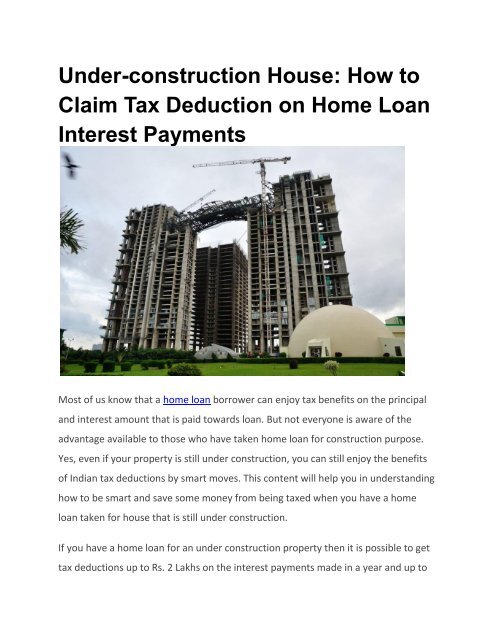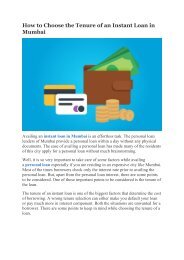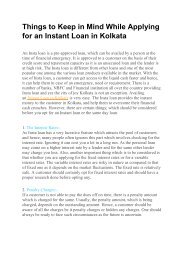Under construction House How to Claim Tax Deduction on Home Loan Interest Payments (2)
Most of us know that a home loan borrower can enjoy tax benefits on the principal and interest amount that is paid towards loan. But not everyone is aware of the advantage available to those who have taken home loan for construction purpose. Yes, even if your property is still under construction, you can still enjoy the benefits of Indian tax deductions by smart moves. Blog: https://financebuddha.com/blog/how-to-claim-tax-deduction-on-home-loan-interest-payments-for-under-construction-house Apply for Loan: https://financebuddha.com/home-loan
Most of us know that a home loan borrower can enjoy tax benefits on the principal and interest amount that is paid towards loan. But not everyone is aware of the advantage available to those who have taken home loan for construction purpose. Yes, even if your property is still under construction, you can still enjoy the benefits of Indian tax deductions by smart moves.
Blog: https://financebuddha.com/blog/how-to-claim-tax-deduction-on-home-loan-interest-payments-for-under-construction-house
Apply for Loan: https://financebuddha.com/home-loan
Create successful ePaper yourself
Turn your PDF publications into a flip-book with our unique Google optimized e-Paper software.
<str<strong>on</strong>g>Under</str<strong>on</strong>g>-<str<strong>on</strong>g>c<strong>on</strong>structi<strong>on</strong></str<strong>on</strong>g> <str<strong>on</strong>g>House</str<strong>on</strong>g>: <str<strong>on</strong>g>How</str<strong>on</strong>g> <str<strong>on</strong>g>to</str<strong>on</strong>g><br />
<str<strong>on</strong>g>Claim</str<strong>on</strong>g> <str<strong>on</strong>g>Tax</str<strong>on</strong>g> <str<strong>on</strong>g>Deducti<strong>on</strong></str<strong>on</strong>g> <strong>on</strong> <strong>Home</strong> <strong>Loan</strong><br />
<strong>Interest</strong> <strong>Payments</strong><br />
Most of us know that a home loan borrower can enjoy tax benefits <strong>on</strong> the principal<br />
and interest amount that is paid <str<strong>on</strong>g>to</str<strong>on</strong>g>wards loan. But not every<strong>on</strong>e is aware of the<br />
advantage available <str<strong>on</strong>g>to</str<strong>on</strong>g> those who have taken home loan for <str<strong>on</strong>g>c<strong>on</strong>structi<strong>on</strong></str<strong>on</strong>g> purpose.<br />
Yes, even if your property is still under <str<strong>on</strong>g>c<strong>on</strong>structi<strong>on</strong></str<strong>on</strong>g>, you can still enjoy the benefits<br />
of Indian tax deducti<strong>on</strong>s by smart moves. This c<strong>on</strong>tent will help you in understanding<br />
how <str<strong>on</strong>g>to</str<strong>on</strong>g> be smart and save some m<strong>on</strong>ey from being taxed when you have a home<br />
loan taken for house that is still under <str<strong>on</strong>g>c<strong>on</strong>structi<strong>on</strong></str<strong>on</strong>g>.<br />
If you have a home loan for an under <str<strong>on</strong>g>c<strong>on</strong>structi<strong>on</strong></str<strong>on</strong>g> property then it is possible <str<strong>on</strong>g>to</str<strong>on</strong>g> get<br />
tax deducti<strong>on</strong>s up <str<strong>on</strong>g>to</str<strong>on</strong>g> Rs. 2 Lakhs <strong>on</strong> the interest payments made in a year and up <str<strong>on</strong>g>to</str<strong>on</strong>g>
1.5 Lakhs <str<strong>on</strong>g>to</str<strong>on</strong>g>wards any principal payments made under Secti<strong>on</strong> 80C of the Income <str<strong>on</strong>g>Tax</str<strong>on</strong>g><br />
Act. <str<strong>on</strong>g>How</str<strong>on</strong>g>ever, it is important <str<strong>on</strong>g>to</str<strong>on</strong>g> keep in mind that this tax benefit is not available if<br />
the home loan payments are during pre-<str<strong>on</strong>g>c<strong>on</strong>structi<strong>on</strong></str<strong>on</strong>g> phase. There are certain types<br />
of property purchase wherein the buyer does not have <str<strong>on</strong>g>to</str<strong>on</strong>g> pay a penny <str<strong>on</strong>g>to</str<strong>on</strong>g>wards loan<br />
repayment EMI. In such cases this tax deducti<strong>on</strong>s are not applicable.<br />
1. Any property that is still under <str<strong>on</strong>g>c<strong>on</strong>structi<strong>on</strong></str<strong>on</strong>g> will not attract any type of tax for the<br />
interest paid <strong>on</strong> EMI- Secti<strong>on</strong> 24 of IT Act<br />
2. Right from the year the <str<strong>on</strong>g>c<strong>on</strong>structi<strong>on</strong></str<strong>on</strong>g> is complete deducti<strong>on</strong> can be enjoyed up <str<strong>on</strong>g>to</str<strong>on</strong>g> 5<br />
installments <strong>on</strong> pre-<str<strong>on</strong>g>c<strong>on</strong>structi<strong>on</strong></str<strong>on</strong>g> period interest<br />
3. Until <str<strong>on</strong>g>c<strong>on</strong>structi<strong>on</strong></str<strong>on</strong>g> is complete or acquisiti<strong>on</strong> is made, the period is called as “Prior<br />
Period”<br />
4. Period between when the m<strong>on</strong>ey was borrowed up <str<strong>on</strong>g>to</str<strong>on</strong>g> <str<strong>on</strong>g>c<strong>on</strong>structi<strong>on</strong></str<strong>on</strong>g> of the house is<br />
called as “Pre-<str<strong>on</strong>g>c<strong>on</strong>structi<strong>on</strong></str<strong>on</strong>g>” period<br />
5. Until possessi<strong>on</strong> of the house, the borrower will have <str<strong>on</strong>g>to</str<strong>on</strong>g> just pay interest <strong>on</strong> the<br />
loan amount borrowed <str<strong>on</strong>g>to</str<strong>on</strong>g> the lender, this is called as “PPI- Prior Period interest”<br />
6. If the home loan amount is utilized by the borrower for renewal, repairs or re<str<strong>on</strong>g>c<strong>on</strong>structi<strong>on</strong></str<strong>on</strong>g>,<br />
then tax deducti<strong>on</strong> benefits cannot be enjoyed<br />
7. If you repay the principal during pre-<str<strong>on</strong>g>c<strong>on</strong>structi<strong>on</strong></str<strong>on</strong>g> period <str<strong>on</strong>g>to</str<strong>on</strong>g> lender, then this is not<br />
eligible for tax deducti<strong>on</strong>s<br />
8. <str<strong>on</strong>g>Tax</str<strong>on</strong>g> deducti<strong>on</strong> benefit is not available <strong>on</strong> loan taken for buying a plot or land<br />
All tax deducti<strong>on</strong>s under Secti<strong>on</strong> 80C of the IT Act is <strong>on</strong>ly if the payment is made<br />
irrespective of for which year it is made. Any amount paid <str<strong>on</strong>g>to</str<strong>on</strong>g>wards registrati<strong>on</strong> fees<br />
or stamp duty is also applicable for tax deducti<strong>on</strong>s under 80C even if the borrower<br />
has not taken loan. To enjoy this benefit it is important that the borrower should<br />
furnish house <str<strong>on</strong>g>c<strong>on</strong>structi<strong>on</strong></str<strong>on</strong>g> completi<strong>on</strong> certificate.
Having said all these, it is important <str<strong>on</strong>g>to</str<strong>on</strong>g> be aware of the fact that the assessee who<br />
enjoyed tax deducti<strong>on</strong>s is bound <str<strong>on</strong>g>to</str<strong>on</strong>g> repay the deducti<strong>on</strong> amounts in case if he/ she<br />
sell the property within 5 years from the end of Financial Year in which possessi<strong>on</strong> of<br />
house has been obtained. The deducti<strong>on</strong>s will be reclaimed by the Indian<br />
Government under Secti<strong>on</strong> 80C during the financial year when the house property<br />
was sold. If the home loan taken is not for self-occupati<strong>on</strong> purpose then whole<br />
interest amount can be claimed as tax deducti<strong>on</strong>s under Secti<strong>on</strong> 24. There is no<br />
maximum limit for claiming tax deducti<strong>on</strong>s for not self-occupied property.<str<strong>on</strong>g>Tax</str<strong>on</strong>g><br />
deducti<strong>on</strong>s under Secti<strong>on</strong> 24 are for interest <strong>on</strong> home loan and this is <strong>on</strong> accrual<br />
basis. Thus all deducti<strong>on</strong>s have <str<strong>on</strong>g>to</str<strong>on</strong>g> be claimed under Secti<strong>on</strong> 24 the same year even if<br />
no payment is made. It is also important that the <str<strong>on</strong>g>c<strong>on</strong>structi<strong>on</strong></str<strong>on</strong>g> of house should be<br />
completed within 3 years of taking loan. <str<strong>on</strong>g>Tax</str<strong>on</strong>g> deducti<strong>on</strong> <strong>on</strong> interest bey<strong>on</strong>d this<br />
period is not applicable.<br />
<str<strong>on</strong>g>Deducti<strong>on</strong></str<strong>on</strong>g>s Allowed under Secti<strong>on</strong> 24 for <strong>Interest</strong> <strong>Payments</strong> made <strong>on</strong> <strong>Home</strong> <strong>Loan</strong>s<br />
Type of<br />
Property<br />
Self-Occupied Property<br />
Not Self Occupied Property<br />
Completi<strong>on</strong><br />
Status<br />
Completed<br />
within 3 years<br />
Not completed<br />
within 3 years<br />
Completed<br />
within 3 years<br />
Not completed<br />
within 3 years<br />
<str<strong>on</strong>g>Deducti<strong>on</strong></str<strong>on</strong>g><br />
Allowed<br />
Rs. 1,50,000 Rs. 30,000 No Limit No Limit<br />
Summary of <str<strong>on</strong>g>Tax</str<strong>on</strong>g> Benefits available <strong>on</strong> <strong>Home</strong> <strong>Loan</strong>s in India under Secti<strong>on</strong> 24 and<br />
Secti<strong>on</strong> 80C<br />
Particulars Secti<strong>on</strong> 24 Secti<strong>on</strong> 80C<br />
<str<strong>on</strong>g>Tax</str<strong>on</strong>g> <str<strong>on</strong>g>Deducti<strong>on</strong></str<strong>on</strong>g><br />
allowed for<br />
<strong>Interest</strong><br />
Principal
Basis of <str<strong>on</strong>g>Tax</str<strong>on</strong>g><br />
<str<strong>on</strong>g>Deducti<strong>on</strong></str<strong>on</strong>g><br />
Accrual basis<br />
Paid basis<br />
Quantum of <str<strong>on</strong>g>Tax</str<strong>on</strong>g><br />
<str<strong>on</strong>g>Deducti<strong>on</strong></str<strong>on</strong>g> allowed<br />
Self-Occupied Property: Rs. 2,00,000<br />
N<strong>on</strong>- Self Occupied Property: No<br />
Limit<br />
Rs. 1,50,000<br />
Purpose of <strong>Loan</strong><br />
Purchase/ Repair/ Renewal/<br />
C<strong>on</strong>structi<strong>on</strong>/ Re<str<strong>on</strong>g>c<strong>on</strong>structi<strong>on</strong></str<strong>on</strong>g> of a<br />
Residential <str<strong>on</strong>g>House</str<strong>on</strong>g> Property<br />
C<strong>on</strong>structi<strong>on</strong>/ Purchase of a<br />
new <str<strong>on</strong>g>House</str<strong>on</strong>g> Property<br />
Eligibility for<br />
claiming <str<strong>on</strong>g>Tax</str<strong>on</strong>g><br />
deducti<strong>on</strong><br />
Purchase/ C<strong>on</strong>structi<strong>on</strong> should be<br />
completed within 3 years<br />
Nil<br />
Restricti<strong>on</strong> <strong>on</strong> Sale<br />
of Property<br />
Nil<br />
<str<strong>on</strong>g>Tax</str<strong>on</strong>g> <str<strong>on</strong>g>Deducti<strong>on</strong></str<strong>on</strong>g> claimed<br />
would be reversed if Property<br />
sold within 5 years<br />
Important Points <str<strong>on</strong>g>to</str<strong>on</strong>g> be C<strong>on</strong>sidered for <strong>Home</strong> <strong>Loan</strong> <str<strong>on</strong>g>Tax</str<strong>on</strong>g> <str<strong>on</strong>g>Deducti<strong>on</strong></str<strong>on</strong>g>s<br />
<br />
<br />
<br />
<br />
As per Shew Kissan Bhatter v. CIT (1973) 89 ITR 61(SC), interest paid <strong>on</strong> the<br />
outstanding amount is not tax deductible<br />
<str<strong>on</strong>g>Tax</str<strong>on</strong>g> deducti<strong>on</strong> can be availed <strong>on</strong>ly if the <str<strong>on</strong>g>c<strong>on</strong>structi<strong>on</strong></str<strong>on</strong>g> of the housing property is<br />
completed within 3 years of taking home loan<br />
Any commissi<strong>on</strong> paid <str<strong>on</strong>g>to</str<strong>on</strong>g>wards arranging a home loan is not eligible for tax<br />
deducti<strong>on</strong>s<br />
M<strong>on</strong>ey spent <str<strong>on</strong>g>to</str<strong>on</strong>g>wards registrati<strong>on</strong> of the housing property and stamp duty is<br />
eligible for tax deducti<strong>on</strong>s
In case if the house property is not earning any income <str<strong>on</strong>g>to</str<strong>on</strong>g> the owner and thus the<br />
interest of the home loan is a loss, then such loss can be adjusted against income<br />
from various other heads within the same financial year<br />
In case if the loss incurred cannot be set off against income from other heads of the<br />
same financial year, such losses can be carried forward up<str<strong>on</strong>g>to</str<strong>on</strong>g> next 8 years financial<br />
years.<br />
Only the pers<strong>on</strong> who has c<strong>on</strong>structed or acquired the property can enjoy tax<br />
benefits. This benefit is allowed <str<strong>on</strong>g>to</str<strong>on</strong>g> its successor of the property.<br />
Limit for <strong>Home</strong> <strong>Loan</strong> <str<strong>on</strong>g>Tax</str<strong>on</strong>g> Benefits in India<br />
<br />
<br />
<br />
<br />
The below tax benefits are not for a property but for individual who is owning<br />
house<br />
In case the property is purchased joint, both the owners can enjoy the benefit<br />
however, the limit <str<strong>on</strong>g>to</str<strong>on</strong>g>gether will remain the same<br />
The percentage of benefit of tax deducti<strong>on</strong> is usually calculated <strong>on</strong> the percentage<br />
share of ownership/ EMI payment of the loan amount for joint ownership<br />
Though you are staying in rented house and applying for HRA deducti<strong>on</strong>s, the<br />
benefits of tax deducti<strong>on</strong>s for house property under <str<strong>on</strong>g>c<strong>on</strong>structi<strong>on</strong></str<strong>on</strong>g> can also be<br />
enjoyed by the assesse<br />
Quantum of <str<strong>on</strong>g>Deducti<strong>on</strong></str<strong>on</strong>g> (Rs.)<br />
Particulars<br />
Self-Occupied Property<br />
N<strong>on</strong>-Self Occupied<br />
Property<br />
Secti<strong>on</strong> 24 2,00,000 No Limit
Secti<strong>on</strong> 80C 1,50,000 1,50,000<br />
Secti<strong>on</strong> 80EE 50,000 50,000<br />
In order claim these tax deducti<strong>on</strong>s it is important <str<strong>on</strong>g>to</str<strong>on</strong>g> share documents and<br />
statements c<strong>on</strong>firming the amount paid <str<strong>on</strong>g>to</str<strong>on</strong>g>ward interest and principal of the home<br />
loan repayment amount, <str<strong>on</strong>g>c<strong>on</strong>structi<strong>on</strong></str<strong>on</strong>g> status of the house property should be<br />
furnished. These will be c<strong>on</strong>sidered with the taxable income of the individuals and<br />
any eligible tax benefits will be deducted.<br />
Though there is strict time-frame <str<strong>on</strong>g>to</str<strong>on</strong>g> complete house <str<strong>on</strong>g>c<strong>on</strong>structi<strong>on</strong></str<strong>on</strong>g>s, it is good <str<strong>on</strong>g>to</str<strong>on</strong>g> take<br />
tax benefits <strong>on</strong> under <str<strong>on</strong>g>c<strong>on</strong>structi<strong>on</strong></str<strong>on</strong>g> house property. Any interest paid during the<br />
financial year <str<strong>on</strong>g>to</str<strong>on</strong>g>wards interest of home loan will attract this tax deducti<strong>on</strong>. In India<br />
all home loans for under <str<strong>on</strong>g>c<strong>on</strong>structi<strong>on</strong></str<strong>on</strong>g> property is structured such a way that the<br />
installed is released by the bank according <str<strong>on</strong>g>to</str<strong>on</strong>g> the <str<strong>on</strong>g>c<strong>on</strong>structi<strong>on</strong></str<strong>on</strong>g> stage of the property.<br />
Regular and timely inspecti<strong>on</strong> will be c<strong>on</strong>ducted by the bank before releasing each<br />
installment in order <str<strong>on</strong>g>to</str<strong>on</strong>g> ensure that home loan amount is being utilized for the<br />
<str<strong>on</strong>g>c<strong>on</strong>structi<strong>on</strong></str<strong>on</strong>g> purpose <strong>on</strong>ly.<br />
All the above said tax benefits are applicable <strong>on</strong>ly for residential property whether it<br />
is an independent villa, gated community or even an apartment. It is important <str<strong>on</strong>g>to</str<strong>on</strong>g><br />
understand the strict timelines <strong>on</strong> home loan under <str<strong>on</strong>g>c<strong>on</strong>structi<strong>on</strong></str<strong>on</strong>g> tax benefits and act<br />
accordingly <str<strong>on</strong>g>to</str<strong>on</strong>g> get benefited <str<strong>on</strong>g>to</str<strong>on</strong>g> the maximum extent from the home loan. It can<br />
always work for your advantage if it is utilized in the right manner.
What happens if I sell the house property within 5 years of completing it<br />
<str<strong>on</strong>g>c<strong>on</strong>structi<strong>on</strong></str<strong>on</strong>g> through home loan?<br />
In such cases, tax implicati<strong>on</strong>s will be attracted <str<strong>on</strong>g>to</str<strong>on</strong>g>wards home loan. All deducti<strong>on</strong>s<br />
enjoyed through this featured will be reversed <str<strong>on</strong>g>to</str<strong>on</strong>g> your income tax calculati<strong>on</strong>s and a<br />
lump sum amount will have <str<strong>on</strong>g>to</str<strong>on</strong>g> be paid. It will simple be your income of the particular<br />
financial year which is taxable.On the other hand, if you decide <str<strong>on</strong>g>to</str<strong>on</strong>g> sell the property<br />
<str<strong>on</strong>g>to</str<strong>on</strong>g> use the fund <str<strong>on</strong>g>to</str<strong>on</strong>g> invest in a self-c<strong>on</strong>structed house, then it is possible <str<strong>on</strong>g>to</str<strong>on</strong>g> claim<br />
exempti<strong>on</strong>s <strong>on</strong> capital gains as l<strong>on</strong>g as the new property is completed within 3 years<br />
of the sale of old house (asset).<br />
Knowing the terms and c<strong>on</strong>diti<strong>on</strong>s and how tax is calculated <strong>on</strong> house property<br />
which are under <str<strong>on</strong>g>c<strong>on</strong>structi<strong>on</strong></str<strong>on</strong>g> will definitely help you <str<strong>on</strong>g>to</str<strong>on</strong>g> manage your tax and you will<br />
also be able <str<strong>on</strong>g>to</str<strong>on</strong>g> enjoy lot of tax benefits. Knowing what can be availed and applying<br />
for the same at the right time will help you in getting maximum tax benefits within a<br />
financial year.


















